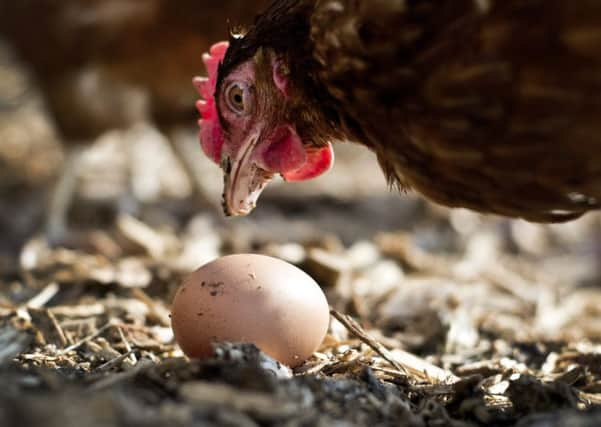Sure as eggs is eggs, food scares are not over yet


Fewer people, however, were likely to have caught the news that the most cautious advisory body in the country – the Food Standards Agency (FSA) – now looks to be set to remove its long-standing cautionary advice on what had once been portrayed as an endemic risk of food-poisoning.
The salmonella in eggs scare began 28 years ago when MP Edwina Currie declared, in an ill-advised impromptu remark during a TV interview, that most of the egg production in the country was affected with salmonella.
Advertisement
Hide AdAdvertisement
Hide AdBut while the egg sector responded with shock at the time, hard work from those involved in the industry soon saw any risk reduced to negligible levels. However if getting rid of the risk was hard work, convincing the authorities to remove the legacy from that time – in the form of advice that certain groups should “avoid runny eggs” – has been just as tough a battle.
However the FSA has now launched a consultation on lifting this unhelpful proviso – and the authorities could finally be set to deem runny eggs safe for everyone, including pregnant women, babies and older people – provided they carry the British lion stamp of approval.
Looking back, though, the 1980s and 90s seemed to consist of an almost endless round of hysterical food scares. The salmonella in eggs fiasco was swiftly followed by the BSE (or mad cow) scare – a piece of hysteria which threatened to ruin the beef industry in the UK, despite the fact that it affected mainly dairy cattle.
Farmers have been living with extra regulations and associated costs ever since – despite the fact that there have been no cases for years.
Tagging along not far behind BSE, the industry found itself stumbling into the “Frankenfoods” scare, as genetically modified (GM) crops were portrayed as the latest horror to threaten the country’s dinner plates.
While this showed just how prone the industry can be to idle minds on a slow news day and highlighted that we are always just a few misguided TV clips or newspaper articles away from a scare story, it also betrayed the lack of trust which consumers had in the whole food industry at the time.
From farming perspective, rebuilding this trust and dramatically improving communications has played an important role as the industry has clawed its way out from public image hole into which it had inadvertently stumbled.
However the more recent horse-meat scare was testament to just how much our image has improved. In fact farmers almost gained out of this one – as it not only made people seek out better quality meat but it also raised awareness of some of the highly questionable business practices being used by the supermarkets in their dealings with the farming industry.
Advertisement
Hide AdAdvertisement
Hide AdHowever the fuss in recent months over the weedkiller glyphosate shows that we haven’t waved bye-bye to the whims of pressure groups with their own agendas.
And the recent high-profile (although apparently unsuccessful) campaign by the Soil Association to get bread-makers and supermarkets to reject flour from crops treated prior to harvest only shows that the issue is far from over.
But if the campaigners do eventually get their way and the weedkiller is either banned outright or its use as a pre-harvest desiccant is prohibited, while it might simply add some extra drying costs in some parts of the world, in Scotland’s wet climate it could mean crops being left in the fields to rot – or simply not grown at all.
And although there’s little likelihood that this would ever result in people in this country suffering from the worst of all food scares – famine – buying more food in from abroad because of pointless food scares could well mean a lot more folk in poorer countries going to bed hungry.